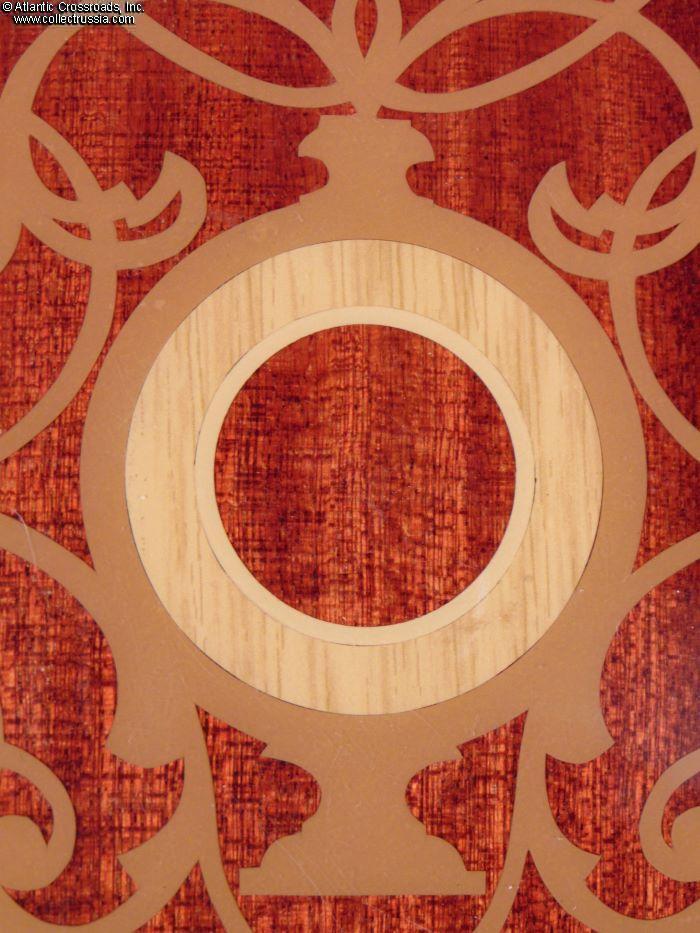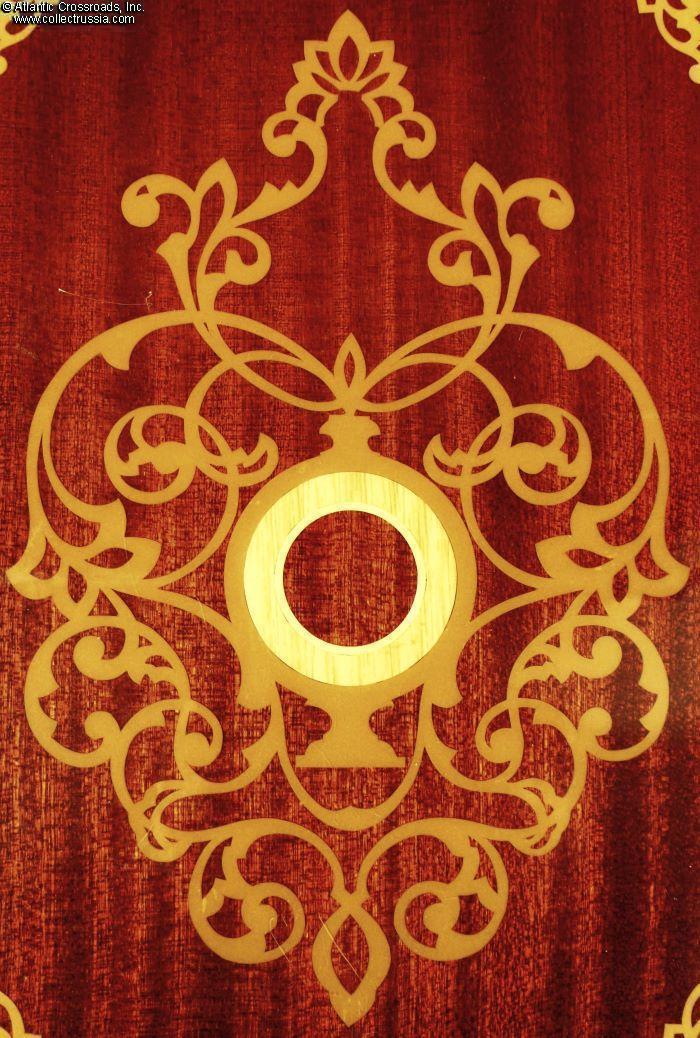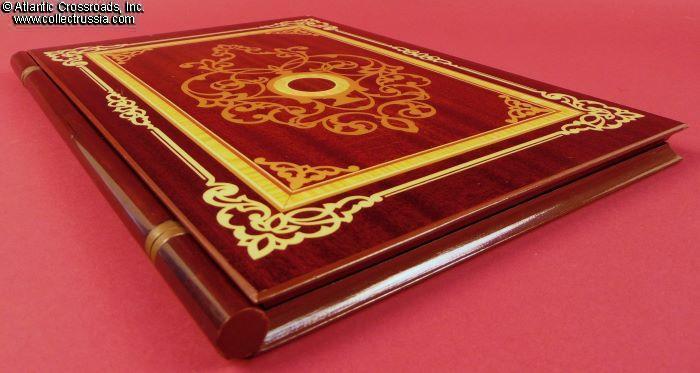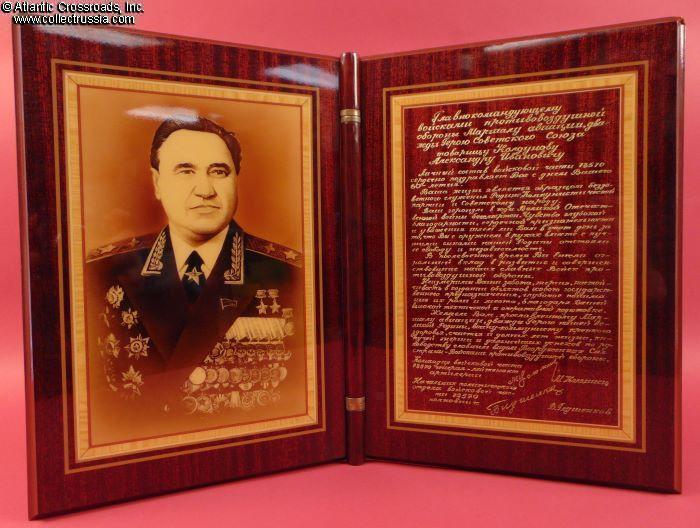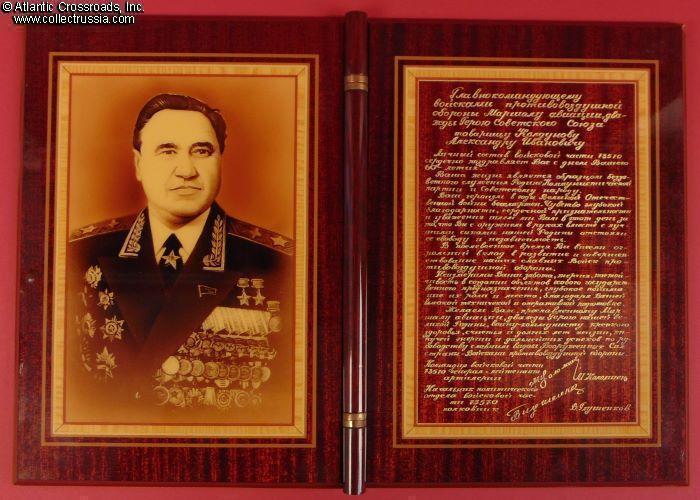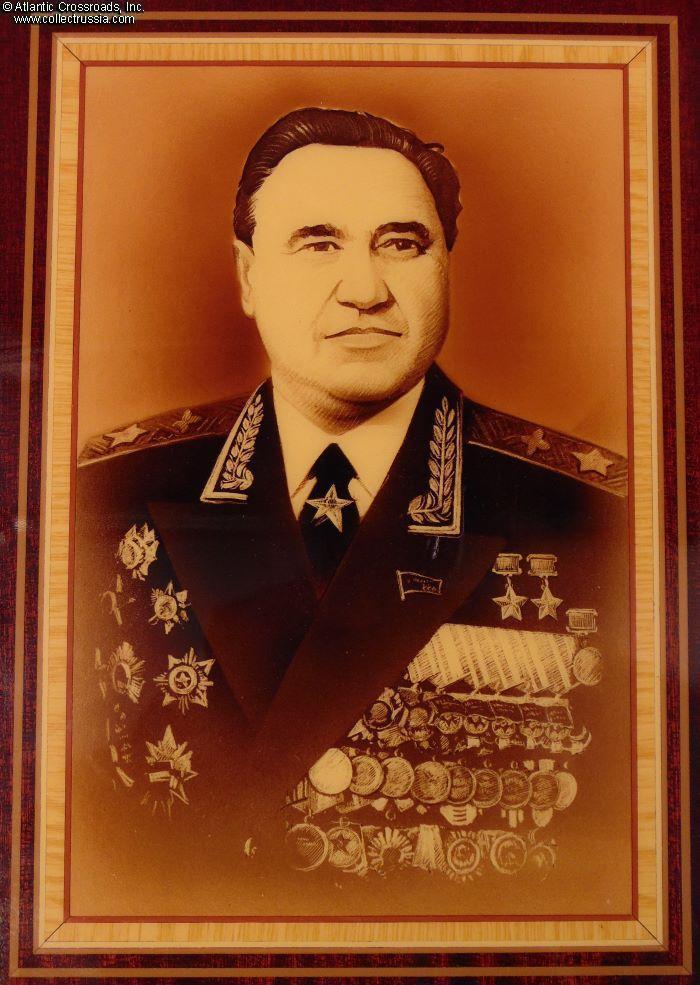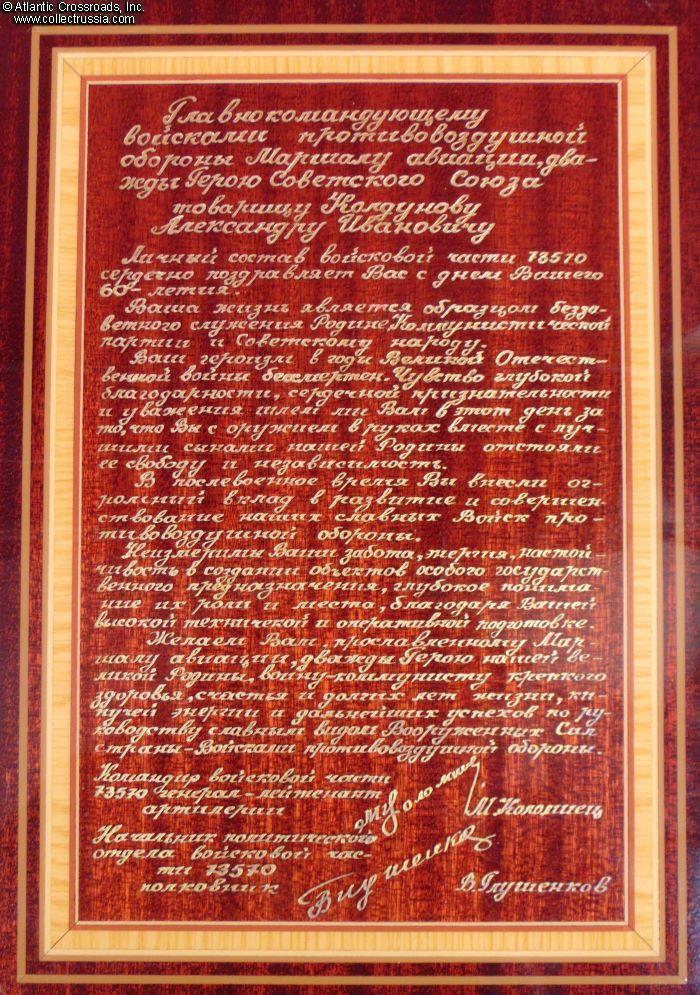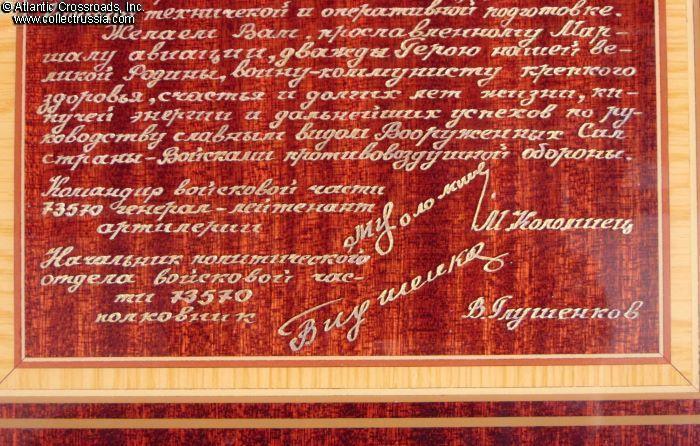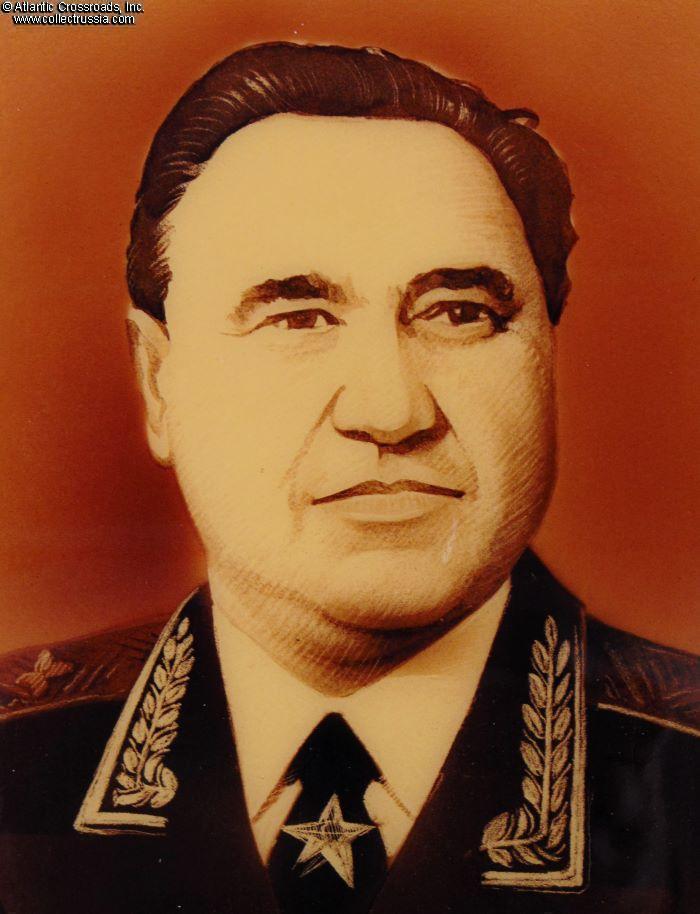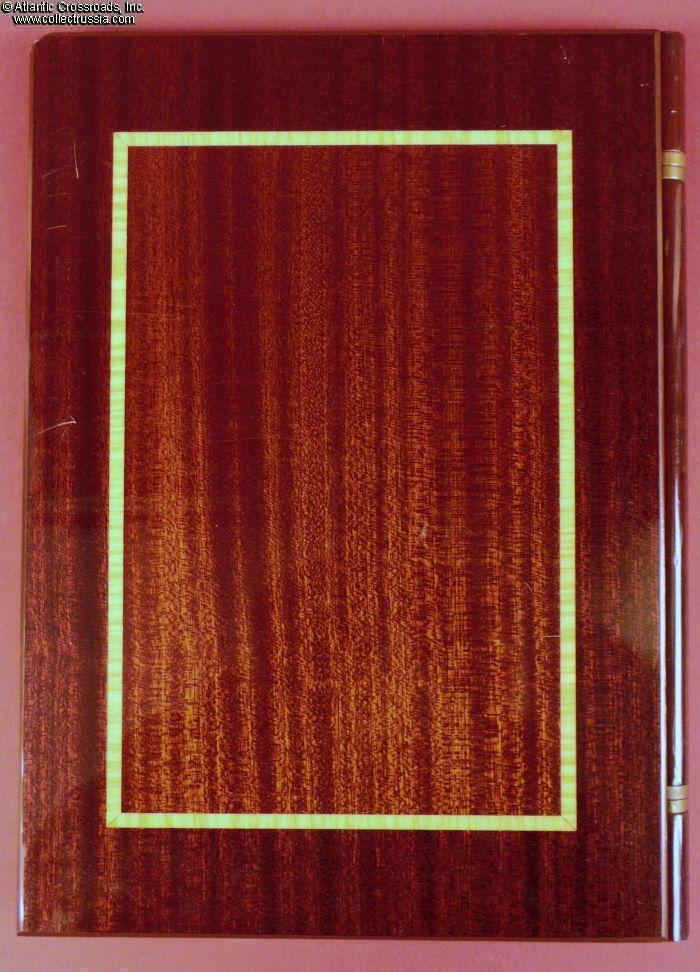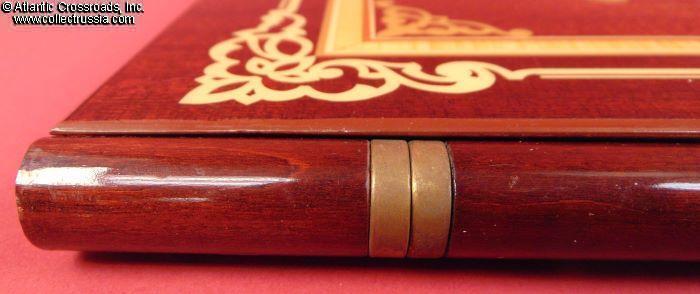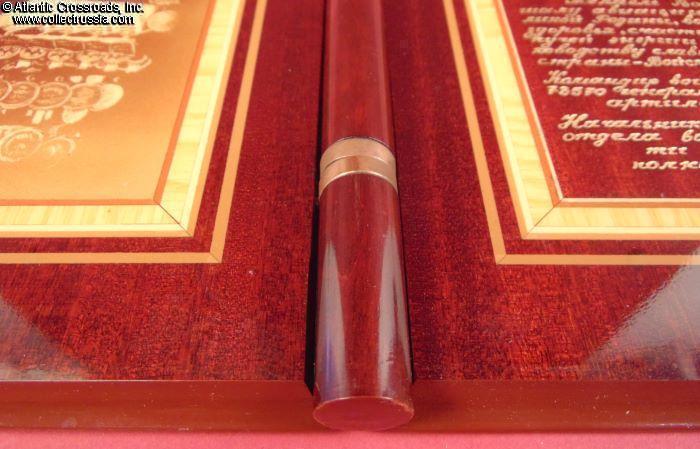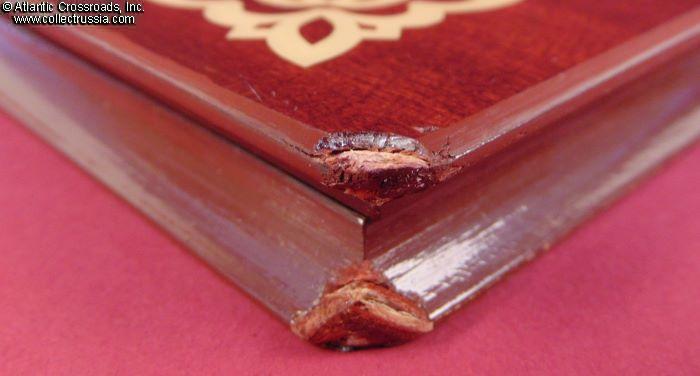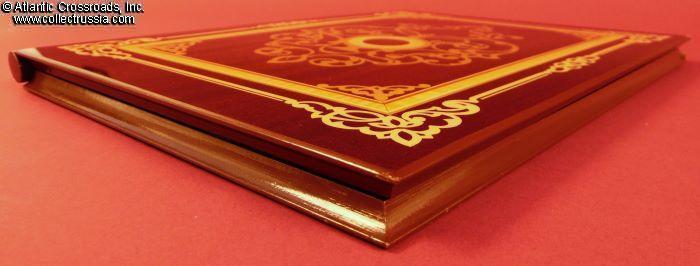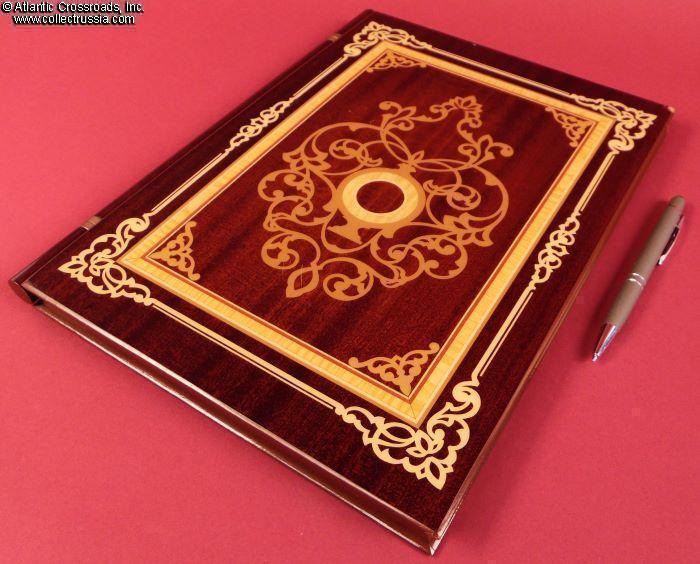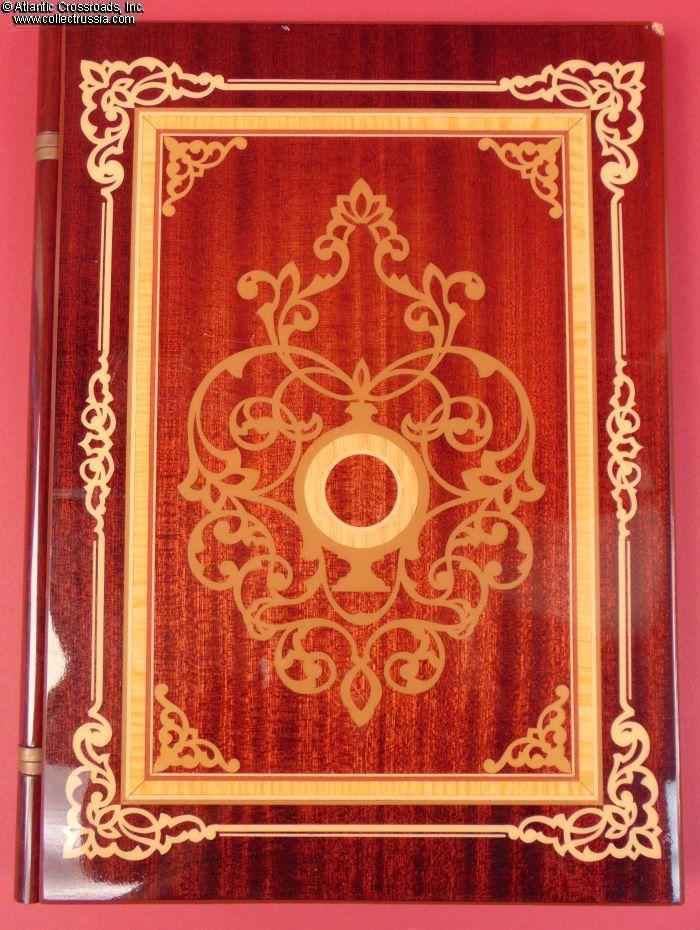
Deluxe Folder with Portrait & Greetings Presented to Air Force Marshal Koldunov on his 60th Birthday, 1983.
In lacquered papier-mâché with wood veneer. Measures 13 x 9 ¾" when folded. The folder features several uncommon and different materials and techniques. The ornamentation is in wood inlay; the portrait appears to be a lithograph on wood veneer, the image is based on a widely published photo portrait of Koldunov. The text of the greeting is engraved and finished in gold paint. Even the spine stands out with its two massive brass hinges.
The left inside page features a portrait of Koldunov in his full-dress marshal's uniform with decorations. The right-side page contains eng
In lacquered papier-mâché with wood veneer. Measures 13 x 9 ¾" when folded. The folder features several uncommon and different materials and techniques. The ornamentation is in wood inlay; the portrait appears to be a lithograph on wood veneer, the image is based on a widely published photo portrait of Koldunov. The text of the greeting is engraved and finished in gold paint. Even the spine stands out with its two massive brass hinges.
The left inside page features a portrait of Koldunov in his full-dress marshal's uniform with decorations. The right-side page contains engraved text of greetings and well-wishes to Commander of Air Defense Forces Air Force Marshal Koldunov on his 60th birthday from the staff of Military Unit 73570. The greeting is signed by the unit's commander, Lt. Gen. Kolomiets, and the unit's chief political officer Col. Glushenkov.
According to open sources available on the internet, Military Unit 73570 was located in the city of Krasnogorsk, a near suburb of Moscow. In the 1980s, it was responsible for Air Defense of the most important sector of the entire Soviet Union - Moscow. By that time, PVO (Russian abbreviation for Anti-Aircraft Defense) already included the relatively new PRO (Russian abbreviation for Anti-Rocket Defense). As early as the late 1970s, the unit's commander M. Kolomiets (one of the signatories of the greeting to Marshal Koldunov) was instrumental in the construction of a giant nuclear-powered radio-location station in the Soviet Far North. In 1983, M/U 73570 was tasked with launching space defense and anti- rocket early warning systems. It appears that M/U 73570 continues to be on the forefront of Russian air defense. In 2011, the unit was given its new banner and is currently known as Military Unit 73570, Command Center of the Space Defense Force of the Ministry of Defense of the Russian Federation.
In very good condition. The lacquered finish has a couple of very light scuffs and scratches but shows them only when you tilt the folder against bright light. Otherwise, they are practically invisible. The top and bottom of the spine feature minuscule chips to the lacquer finish, not very noticeable. The bump to the top corner is the only obvious damage. However, even that is small enough on this large luxuriously appointed item not to distract from its beauty.
Supreme Marshal of Air Force Alexander Koldunov (Александр Иванович Колдунов, 1923 - 1992) was the eighth highest scoring Soviet fighter ace of WW2, twice Hero of the Soviet Union, and supreme commander of the Soviet Air Defense in the late 70s through the late 80s.
Although a highly skilled and illustrious fighter pilot, Koldunov's claim to fame in the West centered around friendly fire incidents and failure to prevent Mathias Rust, a West German, from landing a Cessna airplane on Moscow's Red Square. This humiliation to the entire Soviet armed forces led to Koldunov's immediate dismissal.
Koldunov's fortunes rose during WW2 as a Yak pilot when he became a specialist in the hit-and-run diving attack, aggressively firing at close quarters and breaking away to attack again. Many of his air victories were scored against Luftwaffe fighter craft in the Southern sector. Koldunov's WW2 service included one of aviation history's most unlikely dogfights - against USAAF Lightnings of the 15th AF in a case of mistaken identity. Koldunov, who reportedly shot down 3 American aircraft in the melee, put an end to the friendly fire incident by bravely closing alongside the Lightnings to establish his flight's identity as "friendly" Soviets.
While his postwar career began with great promise, the specter of friendly fire seemed to plague Koldunov, and his career ultimately ended in a humiliation of epic proportions.
In 1968 Koldunov was Deputy Commander of the Baku Air Defense District. One year later he was moved to the Ministry of Defense for a brief tour of duty, and in 1970 he succeeded Colonel-General Vasilii Okunev as CINC of the ultra-important Moscow Air Defense District.
Koldunov's career continued to rise. In 1978 he was promoted to Marshal of the Air Force in charge of PVO (Anti Air Defense) of the entire country. It was at this post that his career began to unravel. In 1978, a missile was fired at a commercial airliner with loss of 2 people. On September 1, 1983, a commercial 747 airliner, Korean Air Flight 007, strayed off course and was shot down resulting in needless death of 269 civilians. But it wasn't until 1987 that his career came to an end at the hands of 19-year-old West German student Mathias Rust who penetrated air defenses under Koldunov's authority, to land his Cessna in Red Square.
The event hit the Soviet Union like a bombshell as it became evident that the much-touted "impenetrable" air defense system was a hollow shell created by the Communist propaganda machine, like so much else that was the Soviet Union. Koldunov was forced to retire from his post, a humiliation that perhaps contributed to his death in 1992. Although Koldunov was made a scapegoat for this failure, the truth was fast becoming clear to the Soviet population. Events like Rust's flight and the Chernobyl nuclear accident a year earlier created a very real sense that the Communist Regime was teetering on the brink of collapse.
Overall, this is a uniquely elaborate and artistic piece on a level of splendor no Soviet citizen would ever encounter outside of a museum. It is hard to imagine the skill and amount of work that went into its creation. Items of this magnitude very rarely become available to a Western collector.
Please note that the pen in our last photo is for size reference.
$1,800.00 Add to cart

